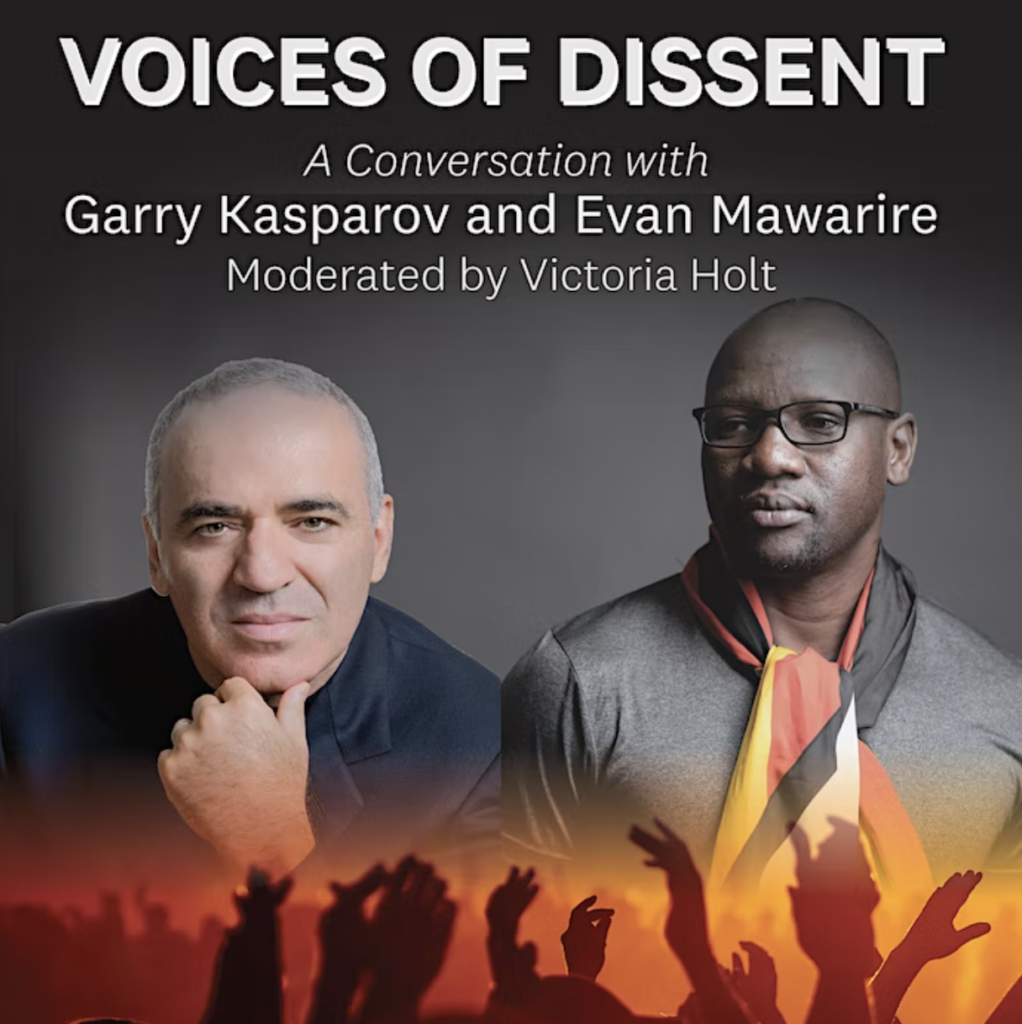
On October 20, 2022, for an event entitled “Voices of Dissent,” Dartmouth’s Dickey Center for International Understanding hosted two famous dissidents: Russian chess grandmaster Garry Kasparov and Zimbabwean pastor and democracy activist Evan Mawarire. In the event, moderated by Victoria Holt of the Dickey Center, the pair discussed their involvement in taking stands against Vladamir Putin and Robert Mugabe, respectively.
The event was held in the Grand Ballroom of the Hanover Inn and ran from 5:00-6:30pm. Somewhat strangely, the two men did not interact with and barely acknowledged each other throughout much of the event. A biographical video of Garry Kasparov was followed by an address from Kasparov, and then a video from Evan Mawarire was followed by an address from Mawarire. It was only in a final Q&A session, of pre-vetted audience questions, that each man definitively acknowledged he was not, in fact, alone.
Several events of Kasparov’s life were emphasized in his biographical video: the difficulty of his childhood in the Soviet Union, when winning was the only option; his victory over Mikhail Tail to become the world champion; and his involvement in and arrests for protests against Putin. During his speech, Kasparov emphasized how his protesting was a “forced choice,” even though it led to his exile from Russia. He remarked, “I did what my mother taught me.” While his arrests were significant, Kasparov said that he had hoped that his mistreatment would have stirred stronger resistance towards Putin in his kinsmen. He joked,“I wish Russian men would be [as] brave as Iranian women.” This sense of a necessity to act was similarly expressed by Mawarire.
Mawarire’s biographical video began with the release of his viral video, which launched the #ThisFlag movement. In the video, the pastor passionately orated with the Zimbabwean flag wrapped around him. Mawarire never expected his efforts to inspire a large population, and, when they did, he attempted to step back and avoid punishment. However, he ultimately elected to continue speaking up for what he believed in. Mawarire continued to post videos that would eventually lead to his arrest and later torture in prison, in hopes that his children would not have to live under the same tyranny that he and his family had faced for generations. The movement that he inspired culminated in a general strike on May 25, 2017. Around 9 million of Zimbabwe’s 14 million people stayed home, leading to a temporary shutdown of the country. This, along with multiple other protests, provoked the resignation of Robert Mugabe. When discussing the torture that he endured, Evan remarked that “[s]peaking truth to power has a price.”
After Mawarire’s speech, the two men began to field audience questions posed by moderator Victoria Holt. During this Q&A session, Holt prompted the pair to explain why the rest of the world views America as the quintessential bastion of freedom. Mawarire elected to emphasize the power of the U.S. Constitution, saying that the supposed constitutional rights of Zimbabweans are blatantly disregarded in the country. Kasparov agreed, describing the U.S. Constitution as one of the most significant documents in human history. The pair also commented upon the ails plaguing those in free societies. Mawarire remarked, “I am surprised [by] the power that ordinary people do not know they have,” and Kasparov added that “they don’t appreciate the history of … American democracy.” The two went on to promote the nonprofit organization which they together lead: The Renew Democracy Initiative.
While the speakers’ stories of their stalwart support for freedom in the face of oppression are deserving of commendation, the event itself suffered from a miasma of apathy, at least to a good portion of the audience. I am convinced that many in the audience came to the event simply due to the fame of Gary Kasparov’s chess career — those who wished to know more about Kasparov’s experiences in the world of chess were surely bored beyond belief. Chess was, in fact, mainly mentioned metaphorically when Kasparov spoke of his efforts in striving for a Russia ruled by the will of the people. Kasparov was, moreover, unable to stay after the event to sign autographs. Finally, I note that the speakers often employed trite expressions and superfluous metaphors. While an important event that featured two renowned speakers, “Voices of Dissent” produced such a sedative effect that I cannot blame its audience members if they caught a catnap.

Be the first to comment on "Voices of Dissent: A Sedative Delivered by Garry Kasparov and Evan Mawarire"